DAZZLING DOMINGO IN MASSENET’S MASTERPIECE
What do world-renowned singers do once they have reached the age of retirement? On the strength of their name, they fill cabarets and concert houses across the land with nostalgia-filled patrons who seek a glimpse of their heroes live. Recent years have seen both opera and Broadway stars in just such concerts, and sadly they prove to be mere wisps of their former glory who should have hung up their vocal chords 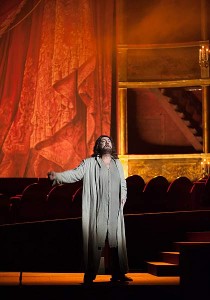 long ago. This is why I was somewhat skeptical when I went to see the great opera tenor Plácido Domingo at the Greek Theatre at UC Berkeley last September. But the indefatigable, fierce, thrilling, commanding, stirring, sparkling, and personality-drenched Domingo not only sounded sensational as a strong, mature baritone, but his emotional strength, passionate vitality, and terrific enunciation—whether warm and tender or silly and comical—actually gave me chills.
long ago. This is why I was somewhat skeptical when I went to see the great opera tenor Plácido Domingo at the Greek Theatre at UC Berkeley last September. But the indefatigable, fierce, thrilling, commanding, stirring, sparkling, and personality-drenched Domingo not only sounded sensational as a strong, mature baritone, but his emotional strength, passionate vitality, and terrific enunciation—whether warm and tender or silly and comical—actually gave me chills.
An opera star reinventing himself with such success was a wonder to behold. At 73, Domingo’s vigorous energy may be genetic (he sings about 40 operatic performances a year, performs about 6 to 10 large-venue concerts and retains conducting duties as well), but by expanding his repertoire, the general director of the Los Angeles Opera proved that old tenors never die, they just find their inner baritone.
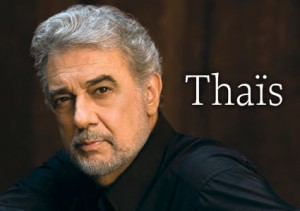 Now, Domingo leaves the administrative chair to appear at LA Opera in Jules Massenet’s Thaïs. Recently adding the baritone role of the parsimonious Athanaël to his staggering list of more than 140 operatic achievements, Domingo will take to the stage at the Dorothy Chandler Pavilion beginning Saturday, May 17. Of Domingo’s performance at Valencia’s Palau de les Arts, Opera News declared that “Athanaël falls entirely in Domingo’s present comfort zone—a baritone role with thrilling forays into tenor ground and occasional loud, sustained notes that show the tenor’s extraordinary vocal longevity.” Expect the legendary and tireless septuagenarian to receive an ovation even before he sings a note.
Now, Domingo leaves the administrative chair to appear at LA Opera in Jules Massenet’s Thaïs. Recently adding the baritone role of the parsimonious Athanaël to his staggering list of more than 140 operatic achievements, Domingo will take to the stage at the Dorothy Chandler Pavilion beginning Saturday, May 17. Of Domingo’s performance at Valencia’s Palau de les Arts, Opera News declared that “Athanaël falls entirely in Domingo’s present comfort zone—a baritone role with thrilling forays into tenor ground and occasional loud, sustained notes that show the tenor’s extraordinary vocal longevity.” Expect the legendary and tireless septuagenarian to receive an ovation even before he sings a note.
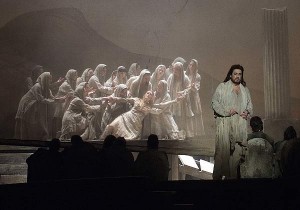 Premiering in 1894, Massenet’s opera, based on a novel of the same name published four years earlier by Anatole France, is a comédie lyrique in three acts and seven tableaux set to the French libretto by Louis Gallet.
Premiering in 1894, Massenet’s opera, based on a novel of the same name published four years earlier by Anatole France, is a comédie lyrique in three acts and seven tableaux set to the French libretto by Louis Gallet.
For the most part, an opera title gives very little or nothing away about the story it tells. Since Thaïs is sometimes mistakenly spelled without the umlaut (Thais), thoughts might turn to the peoples of Thailand or, if you happen to be versed in marine biology, a predatory sea snail and genus of gastropods, a taxonomic class within the phylum Mollusca. These thoughts may be highly unlikely, but the Latin-derived symbol (¨) used as a diacritic over a vowel indicating a hiatus in pronunciation after another vowel, while perhaps baffling, does muster curiosity of the exotic. And “exotic” is an apt description of Thaïs.
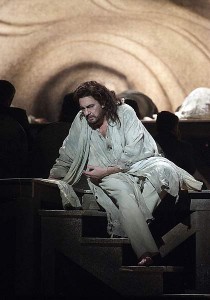 The character of Thaïs is a celebrated courtesan in the fourth-century Byzantine city of Alexandria, when Christianity had recently been brought to Egypt. The lascivious and luxurious life she leads, however, is fiercely disapproved of by the Cenobite monk, Athanaël. Setting out from his monastery, Athanaël attempts to convert her to the faith; however successful, erotic thoughts gradually overwhelm him, leading to a declaration of love. While Massenet’s preceding operas Manon (1884) and Werther (1892) are oft-produced, Thaïs is not, although it similarly renders a rigid interpretation of its two central characters.
The character of Thaïs is a celebrated courtesan in the fourth-century Byzantine city of Alexandria, when Christianity had recently been brought to Egypt. The lascivious and luxurious life she leads, however, is fiercely disapproved of by the Cenobite monk, Athanaël. Setting out from his monastery, Athanaël attempts to convert her to the faith; however successful, erotic thoughts gradually overwhelm him, leading to a declaration of love. While Massenet’s preceding operas Manon (1884) and Werther (1892) are oft-produced, Thaïs is not, although it similarly renders a rigid interpretation of its two central characters.
There is much to offer a modern audience, from the ravishingly beautiful score to the well-written libretto. On the surface, the story confronts and tests religion and religious practice. Look deeper, and it brings into judgment conspicuous and conceited wealth, and illustrates how extremist behaviors can conceal contradictions with porcelain armor, begging the question: Can self-discipline lead to untruthfulness in oneself?
 But it is Palémon (played by bass Valentin Anikin in this production), Athanaël’s superior and leader of the Cenobites, who instructs us. He advises Athanaël against leaving for Alexandria to attempt to convert Thaïs. No matter what our thoughts and beliefs and how much they contrast another’s, is it acceptable to impose our own beliefs on others? With music that is abundantly subliminal, and with enough in the story’s themes for us to ponder, Thaïs might afford the audience an opportunity for an extraordinary spiritual journey at the theater.
But it is Palémon (played by bass Valentin Anikin in this production), Athanaël’s superior and leader of the Cenobites, who instructs us. He advises Athanaël against leaving for Alexandria to attempt to convert Thaïs. No matter what our thoughts and beliefs and how much they contrast another’s, is it acceptable to impose our own beliefs on others? With music that is abundantly subliminal, and with enough in the story’s themes for us to ponder, Thaïs might afford the audience an opportunity for an extraordinary spiritual journey at the theater.
Nino Machaidze sings Thaïs in her debut of the role. She made her LA Opera debut in 2009 as Adina in L’Elisir d’Amore, returned in 2011 as Fiorilla in The Turk in Italy and as Juliette in Romeo et Juliette. The Georgian coloratura soprano is widely celebrated for her adaptability and strength in tackling a wide variety of character roles. The strong, assured, and lovely soprano Hae Ji Chang, who has appeared with LA Opera in Jonah and the Whale, The Magic Flute, and Carmen, will portray Crobyle, a servant of Nicias, a nobleman (played by American tenor Paul Groves).
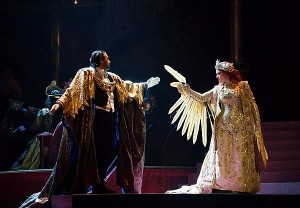 Prolific young director Nicola Raab makes her first mark at LA Opera with this production from The Finnish National Opera, accompanied by the designs of Johan Engels. Again, quoting Opera News: “Under Raab’s hand, the scenes in Alexandria—and especially the one in the oasis where Athanaël drags Thaïs—achieved both expressive beauty and internal consistency. Thaïs’s amazing birdlike dress, by set and costume designer Engels, is one of the best costumes I have ever seen, providing a wonderful visual metaphor for this bird of rare plumage.” Also in his debut at The LA Opera, conductor Patrick Fournillier, co-founding Musical Director and conductor of La Biennale Massenet Festival in France, brings his expertise in Massenet’s music to this exciting production.
Prolific young director Nicola Raab makes her first mark at LA Opera with this production from The Finnish National Opera, accompanied by the designs of Johan Engels. Again, quoting Opera News: “Under Raab’s hand, the scenes in Alexandria—and especially the one in the oasis where Athanaël drags Thaïs—achieved both expressive beauty and internal consistency. Thaïs’s amazing birdlike dress, by set and costume designer Engels, is one of the best costumes I have ever seen, providing a wonderful visual metaphor for this bird of rare plumage.” Also in his debut at The LA Opera, conductor Patrick Fournillier, co-founding Musical Director and conductor of La Biennale Massenet Festival in France, brings his expertise in Massenet’s music to this exciting production.
Thaïs is bountiful in music of profound depth and painterly strength. The mesmerizing entr’acte for violin and orchestra,“Méditation,” is a regular in the orchestral repertoire; “Dis-moi que je suis belle” from Act One and “Celle qui vient 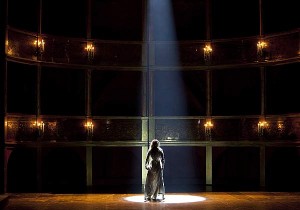 est plus belle” from Act Two are equally beguiling; and the gently caressing music of “Baigne d’eau mes mains et mes lèvres” in the final act paves an eerie course for impending events.
est plus belle” from Act Two are equally beguiling; and the gently caressing music of “Baigne d’eau mes mains et mes lèvres” in the final act paves an eerie course for impending events.
A special concert performance of LA Opera’s production of Massenet’s lyric masterpiece will occur on Tuesday, May 27 at the Renée and Henry Segerstrom Concert Hall in Costa Mesa. The Chandler production runs through June 7. This could very well be the only time you ever get the chance to see this jewel of Massenet’s accomplishments. And don’t forget about Domingo, a bird of rare plumage in his own right.
previous production photos by Guillermo Mendo, Mats Becker and Tato Baeza
Thaïs
Los Angeles Opera
Dorothy Chandler Pavilion, 135 N Grand Ave
Saturday May 17, 2014 at 7:30 pm
Sunday May 25, 2014 at 2:00 pm
Thursday May 29, 2014 at 7:30 pm
Sunday June 01, 2014 at 2:00 pm
Wednesday June 04, 2014 at 7:30 pm
Saturday June 07, 2014 at 7:30 pm
in French with projected English translations
2 hours and 50 minutes, including one intermission
for tickets, call 213.972.8001 or visit LA Opera
Renée and Henry Segerstrom Concert Hall
Tuesday, May 27, 2014 at 7:30 pm
for tickets, visit Segerstrom

